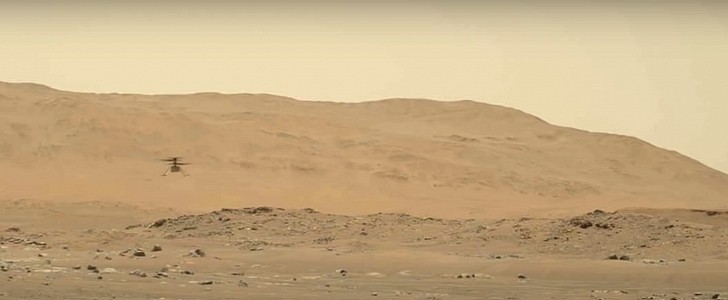History was made again as NASA's Perseverance rover became the first spacecraft to capture sounds from another spacecraft on another planet. On Ingenuity's fourth flight, a microphone included with the SuperCam instrument onboard Perseverance caught the buzzing sound of the little helicopter's blades and the sound of the Martian wind blowing in the distance.
Ingenuity successfully completed its fourth flight on April 30th. The aircraft took off at 10:49 a.m. and made its way up to 16 feet (5 meters) before flying south approximately 436 feet (133 meters) and then back for an 872-foot (266-meter) round trip. In total, the helicopter flew for 117 seconds, setting yet another record compared to its previous flights.
During this mission, Perseverance didn't miss the chance to use one of its two microphones to eavesdrop on its little buddy. The new video that NASA published combines footage of the solar-powered helicopter taken by the rover's mast-mounted camera system or Mastcam-Z with audio from a microphone belonging to its SuperCam laser instrument.
The scientists weren't sure if the microphone would pick up any sound from the flight because Perseverance was stationed 262 feet (80 meters) from the helicopter's takeoff and landing spot. Even if the helicopter's blades rotate at a very fast speed, precisely at 2,537 rotations per minute (rpm), and that would make for a pretty loud noise, their sound is considerably muffled by the very thin Martian atmosphere.
At the beginning of the footage, the wind gusts are blocking out Ingenuity's noise. However, if you listen carefully (in the video below), you can still hear the helicopter's hum over them.
"We had carried out tests and simulations that told us the microphone would barely pick up the sounds of the helicopter, as the Mars atmosphere damps the sound propagation strongly. We have been lucky to register the helicopter at such a distance. This recording will be a gold mine for our understanding of the Martian atmosphere.", said David Mimoun, the science lead for the SuperCam Mars microphone.
During this mission, Perseverance didn't miss the chance to use one of its two microphones to eavesdrop on its little buddy. The new video that NASA published combines footage of the solar-powered helicopter taken by the rover's mast-mounted camera system or Mastcam-Z with audio from a microphone belonging to its SuperCam laser instrument.
The scientists weren't sure if the microphone would pick up any sound from the flight because Perseverance was stationed 262 feet (80 meters) from the helicopter's takeoff and landing spot. Even if the helicopter's blades rotate at a very fast speed, precisely at 2,537 rotations per minute (rpm), and that would make for a pretty loud noise, their sound is considerably muffled by the very thin Martian atmosphere.
At the beginning of the footage, the wind gusts are blocking out Ingenuity's noise. However, if you listen carefully (in the video below), you can still hear the helicopter's hum over them.
"We had carried out tests and simulations that told us the microphone would barely pick up the sounds of the helicopter, as the Mars atmosphere damps the sound propagation strongly. We have been lucky to register the helicopter at such a distance. This recording will be a gold mine for our understanding of the Martian atmosphere.", said David Mimoun, the science lead for the SuperCam Mars microphone.


